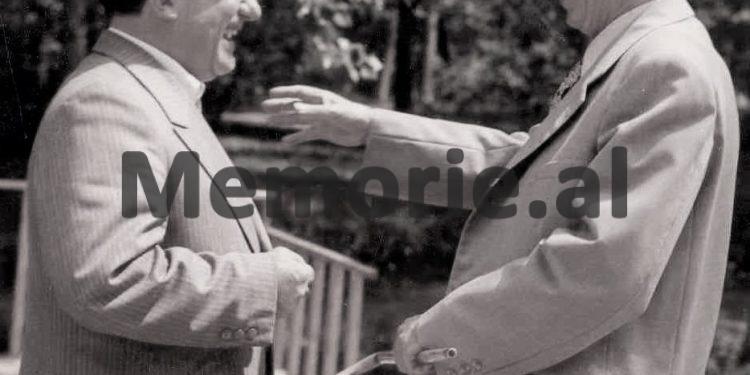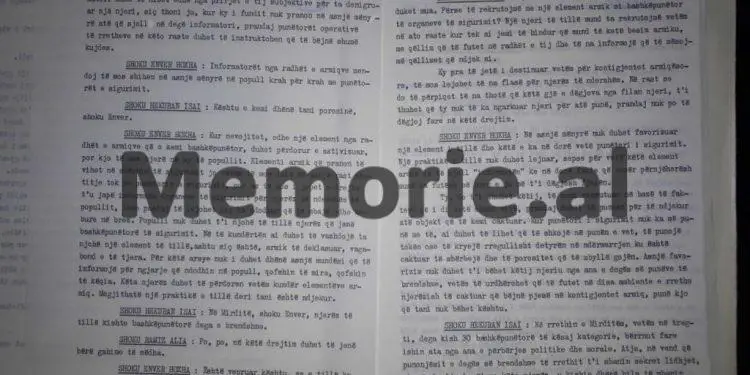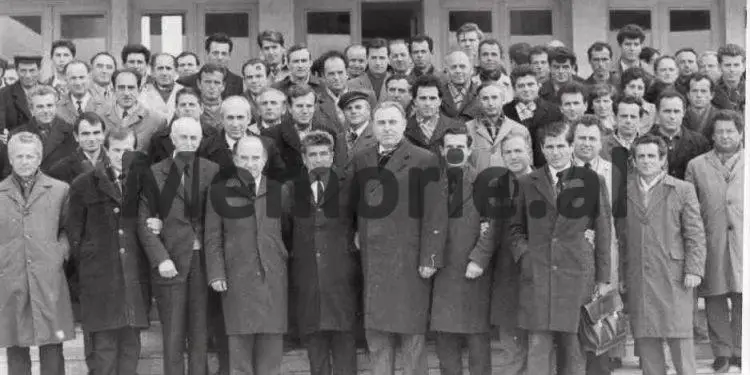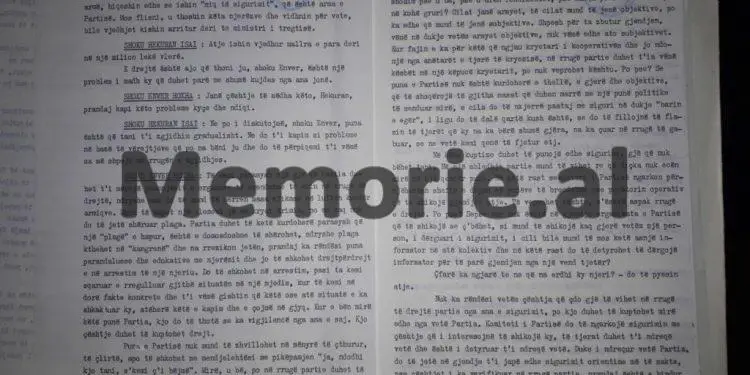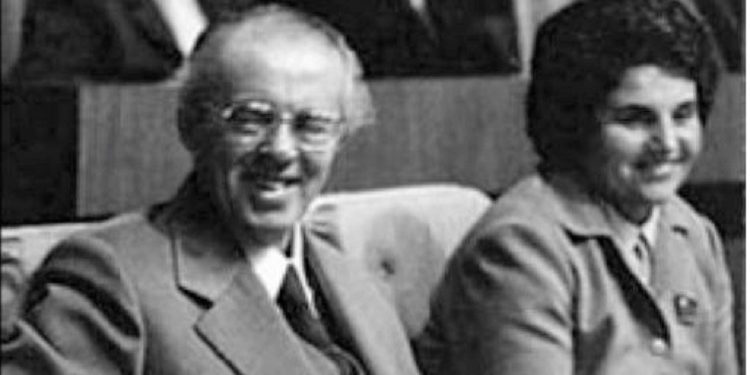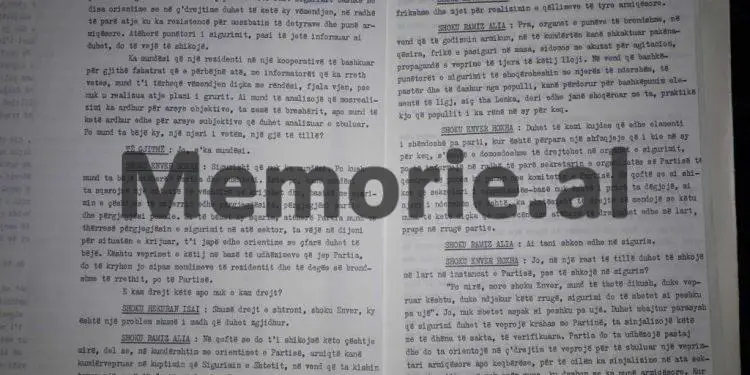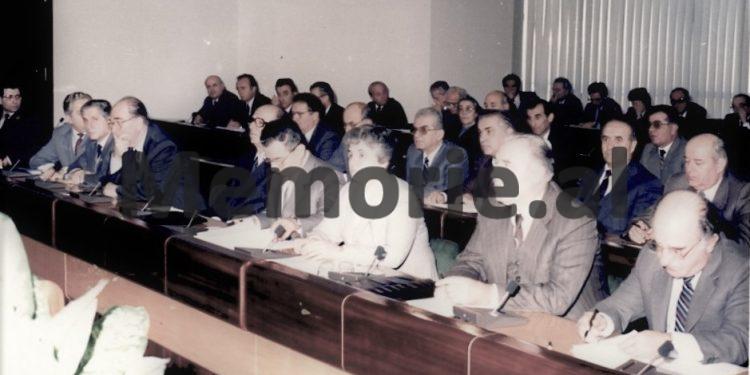Dashnor Kaloçi
Part thirteen
Memorie.al/ publishes some archival documents extracted from the Central State Archive in Tirana (Fund of the former Central Committee of PPSh), which contain the acronym “Secret” and “Top Secret” and belong to a period from January from 1982 until September 1983, where there is a voluminous file with minutes of meetings of the Secretariat of the Central Committee and the Political Bureau of the Central Committee of the PPSh, meetings which were chaired by its General Secretary, Enver Hoxha, where they assisted: Ramiz Alia, Adil Çarçani, Manush Myftiu, Hekuran Isai, Rita Marko, Pali Miska, Hajredin Çeliku, Haki Toska, Simon Stefani, Lenka Çuko, Muho Asllani, Vangjel Çerrava, etc., as the main topic is analysis about the “hostile activity” of Mehmet Shehu and his close collaborators, from Fadil Paçrami, Todi Lubonja, Beqir Balluku, Petrit Dume, Hito Çako, Abdyl Këllezi, Koço Theodhosi, Kiço Ngjela, Vasil Kati, Kadri Hazbiu, Fiqret Shehu, Feçor Shehu, Mihalla q Ziçishti, Llambi Peçini, etc. In the file available to Memorie.al, in addition to the analysis of the “hostile activity of the police agent Mehmet Shehu and his associates Beqir Balluku and Kadri Hazbiu”, in the meetings of the Political Bureau and the daily meetings of the Secretariat of the PPS Central Committee, are analyzed also the activity of the Ministry of Internal Affairs and State Security, with its agency and collaborators, inside and outside the country, the reports and relations of the Albanian state with different countries of the world, such as: the USA, the Soviet Union, West Germany, England, Spain, Italy, as well as those with neighbors, such as Greece and Yugoslavia and the demonstrations in Kosovo, how the world press presented Socialist Albania, the talks with West Germany about the War reparations payments, meetings and conversations with party leaders Marxist-Leninists from different countries of the world, such as Ernst Aust, Zhoao Amazonas, Fosko Dinuçi, etc., regarding the “suicide of Mehmet Shehu”, the problems of Polish immigration Albanian refugees, in different countries of the world, and the change of the exchange rate of the dollar in the remittances, which they made to their relatives in Albania, up to numerous economic problems, from heavy industry, hydropower plants on the cascade of the river Drin, energy import and export, etc., etc.
Continues from last issue
The “Top Secret” document with the minutes of the daily meeting of the secretaries of the Central Committee of the PPSh, held on September 10, 1983, where it was discussed: “On the conclusion of the trial of the remaining enemy elements from Beqir Balluk’s caste and on the necessity of renewing the framework in the Ministry of Internal Affairs and the bodies that depend on it”.
DAILY MEETING OF SECRETARIES OF THE CENTRAL PARTY COMMITTEE ON SEPTEMBER 10, 1983
Top Secret
In this meeting, in which Comrade Hekuran Isai also participated, it was first discussed about the conclusion of the trial of the remaining enemy elements from Beqir Balluku’s caste and the necessity of renewing the staff in the Ministry of Internal Affairs and the bodies that depend on her, for their education with a healthy party spirit, for the need to also carefully interweave old cadres with new ones in other bodies, on the necessity of establishing a party work in the bodies of Internal Affairs and on the care that must be taken to distinguish fair remarks from tendencies with hostile intentions, for the care of a preventive and healing work with people in the spirit of the party, for ensuring the leadership of the Party in the bodies of Internal Affairs, as well as for the structure and powers in the Security bodies.
COMRADE ENVER HOXHA: If the need arises, the Party can, in any case, give an order to the Security to arrest any person who has filled the cup, or not to accept the proposal of the Interior Branch, to arrest another, which it judges that there is no serious fault.
So the Party decides that this or that person should be arrested, put in the investigator’s office or not, kept there for a few days, questioned about this or that issue, then brought to trial, or judged free, if not deems it necessary to arrest him.
The issue is to build a sound work on the part of the Party with the information network of the Ministry of Internal Affairs, in order to eliminate every sick spirit in its bodies.
I have the issue here, that henceforth, it is necessary to inculcate a sound spirit, a suitable working method and a fair understanding in the Party, for Security issues.
But even Security must have a fair meaning for the people, for the Party, for the Front, for the women’s organization and for all other organizations.
The Security worker must not think, as has been thought until now, that he is all-powerful, that he can break anything and do as he pleases.
No, he does not have to be told everything by the Party. When something is dangerous, it can and will be told, but when the Party judges that it is not dangerous, nothing is said.
Whereas safety, if it sees a sick situation itself, has its own duty to inform the Party, because this has more eyes, safety cannot come forward with the claim that it knows everything, while the Party knows nothing. If the Party doesn’t know anything, neither safety can know anything.
And if there is a need to correct the situation somewhere in one direction, this will be corrected by the Party in the first place, while those people who, despite all the efforts made, are seen not to correct it, the party charges the Security bodies as appropriate or the Police, to take their case to court and, according to the degree, to be counseled, or put in prison for re-education. This is a whole spirit that needs to be seen and fattened.
COMRADE HEKURAN ISAI: Yes, there is the spirit that you said, Comrade Enver. Until recently, as all friends know, the Police Worker of the area or neighborhood was called: “almighty”.
COMRADE LENKA CUKO: Yes, that was his name. Regarding the collaborators who have employees of the Department of Internal Affairs in the district, there is a defect, which is related to what you pointed out, Comrade Enver.
Employees do not want to know who the Internal Affairs Branch has associates. However, the way collaborators are made is done very slowly, which in many cases does not leave a good impression on the masses.
If the Operative Worker is accompanied all the time by his co-workers, in the cooperative or in the enterprise, the measures take into account that these are the Security co-workers.
There is also another flaw in this matter, at least as I saw it myself when I was in Lushnje and for this I had made remarks to the employees of the Department of Internal Affairs there.
Regardless of the fact that sometimes they took into account and sometimes they did not take into account the criticisms I made, a part of the Operative Workers activated as their collaborators, people with a bad political composition, not honest, from those people who in the enterprise or in the cooperative, did not you had a good eye, the word comes, who does not have a correct attitude towards women, another who does not have a good attitude in society, in a word, people with vices, that’s why they said: why should Security be such people as collaborators?!
COMRADE ENVER HOXHA: Rightly thought, why should safety have such people who do not enjoy the trust of the employees?!
COMRADE LENKA CUKO: Why does the Security employee go out with a bad man? There are also such cases.
COMRADE HEKURAN ISAI: That’s how it turned out for us in Mirdita!
COMRADE LENKA CUKO: This situation is not only in Mirdita, also in Lushnje where I was, I had noticed that some of the collaborators were known by the masses, that is why a remark was made by the comrades with responsibility, as secretary of the bureau, who said: ” Why do the employees of the Branch keep such people close to us?!
If the Branch needs someone for work problems, let him keep it, but being a politically and morally unsuitable person, a Branch employee should not go out and drink coffee with him, there are many forms to be found others so as not to catch the eye of the crowd at all.
Here comes another problem, which you have raised several times, Comrade Enver, one must be very careful with those from whom Security employees receive information, they must be looked at with a critical eye, who gives these?
In this regard, there are always opinions and subjective assessments. Based on the decisions made by the Political Bureau, there have been cases where, based on the information given, someone who was thought to have made a mistake was called for counseling, but he denied having spoken so and so.
After listening to this person’s answer, we pointed out to the Head of the Branch that he does not agree to have spoken as you informed us.
– No, insisted the Head of the Branch, I have proven this.
-More, with whom did you prove it?!
– I don’t tell him, he waited briefly, that my colleague is on fire, but I have proven this with a man. Therefore, every piece of information should be looked at very carefully, as the informant may start from his subjective inclinations to denigrate a person.
As you say, when the latter does not accept in any way what the informant has brought to the Branch, therefore the Operative Workers of the districts in these cases must be instructed to be very careful.
COMRADE ENVER HOXHA: Informers from the ranks of the enemies, I think, should not be seen in any way in public, side by side with Security workers.
COMRADE HEKURAN ISAI: This is how we have now given the order, Comrade Enver.
COMRADE ENVER HOXHA: When needed, even an element from the ranks of the enemies that we have as collaborators should be used and activated, but this should not be seen by the people.
The enemy element who agrees to be put in the service of the Security, not only not to go for a walk with the Security Workers in any case, but not to be given the right to give information to the Security bodies, for honest people of the people, let it then, as it happened, also carry a cocoon in its belt.
The people should not know such people who are collaborators of the Security. On the contrary, he must continue to recognize such elements as they are declassified enemy, vagabond, etc.
For this reason, he should not be given any opportunity to inform about events happening in the people, whether good or bad. This people should be used, only against enemy elements. However, such a practice has so far been followed.
COMRADE HEKURAN ISAI: In Mirdita, Comrade Enver, such people were collaborators of the Interior Department.
COMRADE RAMIZ ALIA: Yes, yes, in this regard, big mistakes must have been made.
COMRADE ENVER HOXHA: It was done this way; because this was the head of the ministry, therefore, as you said, big mistakes were made in this direction.
COMRADE RAMIZ ALIA: What you say is very right, it seems to me. Why recruit an enemy element, as collaborators of the Security bodies?
We can recruit such a man only in those cases when we are convinced that the enemy can trust him, in order to join his ranks and inform us so that we can learn the goals he pursues.
This, then, should be intended only for hostile contingents, not be allowed to speak to us about honest people. In case he tries to tell us that I heard this from such and such a person, let him be told that; no one charged you with that job, so I’m not listening to you at all in this direction.
COMRADE ENVER HOXHA: In no way should such an element be activated and this is in the hands of the Security Worker himself. This kind of practice should not be allowed, because for this enemy element to bring the “information”, he has facts that tomorrow you can put him in prison and not listen to him again.
You, this one will be told, we have recruited you only on the basis of the facts that you know very well, and therefore you will work to follow the object that we have assigned.
When the Security Worker has no more work to do with him, he must be left to mind his own business, work the land, or regularly perform the work of the establishment he is assigned to serve, and be told to shut up.
No favoritism should be given to this man, by the Department of Internal Affairs, only to be ordered to enter certain premises and circles of certain people who are part of the enemy contingent, a job that is not done like this now.
COMRADE HEKURAN ISAI: In the district of Mirdita, only in Trade, the Branch had 30 associates of this category; they were completely inferior in terms of political and moral composition.
There, instead of the employees of the Internal Department of the district keeping their relationships a secret, they accompanied these people, and they were even allowed to carry revolvers. This was for thieves. But can I trust such a man? Memorie.al
To be continued in the next issue




